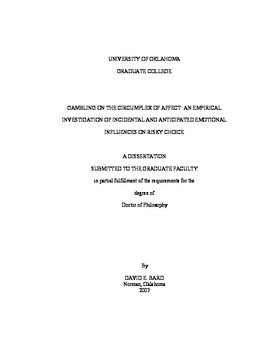| dc.description.abstract | Affective decision-making has begun to change the face of the traditional decision science paradigm (Loewenstein, Weber, Hsee, & Welch, 2001), forcing researchers to consider direct influences of affect on both cognition and behavior, and no longer viewing affect as simple byproduct of each. In what follows, this more modern view of decision-making has been chronicled and summarized, focusing the reader on two broad types of affective influences: those attributable to incidental and expected (or anticipatory) affect. An attempt is made to combine these two types of affective influences into a more general theory of affective decision-making, one that incorporates aspects of the Pleasure-Arousal Hypothesis (Russell & Mehrabian, 1978) and the Circumplex of Affect (Russell & Barrett, 1999). An empirical investigation of this theory was tested using self-report measures of both incidental and expected affect and a certainty equivalency gambling task. Results suggested small direct influences of incidental and expected arousal and valence on gambling choices; yet, little support existed for an indirect effect of incidental affect on the gambling decision through mediating expected affect. Conclusions highlight the promise of a general affective decision-making theory that might explain current paradoxes in risk seeking behaviors, particularly those that occur during adolescence. Appeals were also made, however, for better measurement and methodology within this area of research so that empirically validated propositions can be generalized beyond the pen and well-controlled laboratories. | en_US |
